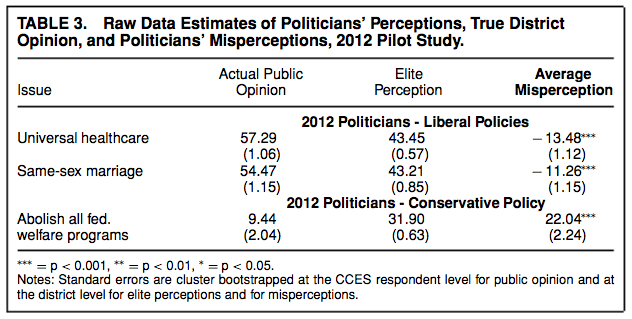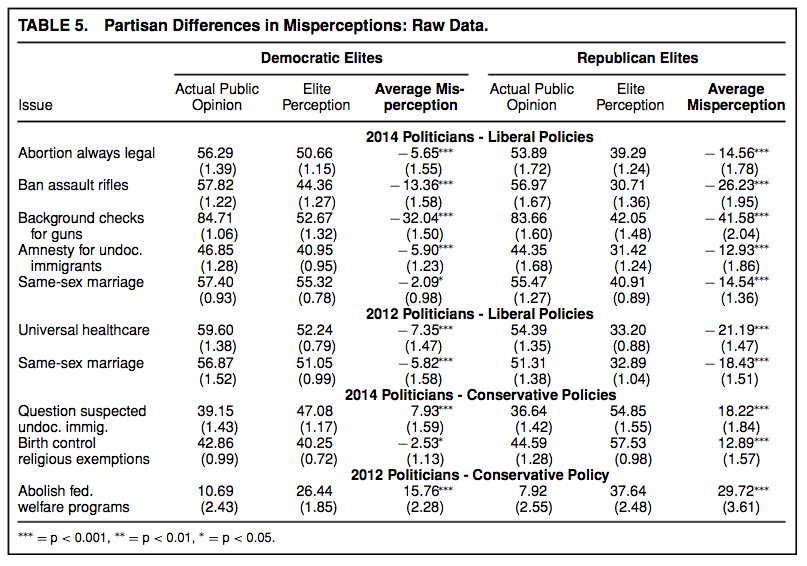When I was in college, everyone had to take a health/PE class. I took it freshman year. There was a lecture portion once a week and a session of physical activity twice a week. I remember sitting in lecture one week and filling out a quiz. We were asked to estimate what percentage of our classmates drank such and such an amount of alcohol, smoked cigarettes, smoked pot, had unprotected sex, and so forth.
After we filled out the surveys, the professor gave us the answers to these questions, obtained from anonymous surveys. We sat in surprise. The results suggested that far fewer of my classmates partook in risky activity than most of us had realized.
The disjuncture between our perceptions of our classmates’ activities and their actual activities was the point of the exercise. The professor explained that if you think all of your peers are doing something, you’re far more likely to do it too than you are if you believe only a few of those in your peer group are actually doing it.
It was that exactly moment in class that came to mind when I read a recent article on Skepchick. Politicians, it seems, think the American public is more conservative than it actually is on a wide range of issues. And as that professor pointed out to a room full of college freshmen that day, that perception matters.
[P]oliticians from both major political parties tend to drastically overestimate how conservative their constituents are on our most important hot-button issues, like immigration, gay rights, abortion, and gun control. Gun control was the issue where politicians were worst at understanding their constituents. 84% of people want mandatory background checks on guns, but politicians thought that number was less than 50%.
This is a problem.
As Rebecca Watson explains:
It’s not quite as bad for other issues, but it’s important to note that on nearly every issue polled, the public majority was on one side of the issue when politicians think they’re on the other. So for instance, being off by 7% might not seem like much, but it is a critical amount when 56% of people want same sex marriage and politicians think that only 49% of people do. Or when 55% of people want abortion to always be legal but politicians think that only 46% do. Or when only 38% of the public want the police to question suspected undocumented immigrants but the politicians think 50% want that. Because in general, our government operates by a majority vote, and this research shows that the government is wrong about what the majority of people want on nearly every important issue happening right now.
Why this mismatch in perception?
The researchers posit that this happens because conservatives are more likely to contact their representatives, especially when their reps are GOP but even when they’re Democrat. They’re motivated to do so by a continuous stream of conservative radio hosts and donors who tell them that they have to call their representatives or the liberals are going to take away their guns, or make them gay marry an immigrant.
Watson questions this explanation because it does not include all of the money that is poured into politics by wealthy conservative donors like the Koch brothers. She suggests that, in part, politicians may convince themselves that they are doing what the public wants to make themselves feel better, when what they are actually doing is following conservative donors’ money like Hansel and Gretel.
While I cannot speak to Watson’s suggestion that the researchers should have more fully considered the impact of campaign donations, and not just the impact of constituent contacts, I think it is worth noting that the researchers choose to survey state legislators, and not national legislators. In other words, contacting your federal representatives is not going to impact this data if you are not also contacting your state lawmakers.
After reading Watson’s piece, I had a look at the study itself and was fascinated by several statistics that Watson (in consideration of time, likely) does not mention in her summary and analysis of the study.

This table suggests that while 57% of Americans favor universal healthcare, politicians (they use the term “elites,” but the “elite” group they are looking at is state legislators) believe only 43% of Americans favor universal healthcare. Similarly, while only 9% of Americans want to ban all federal welfare programs, politicians think that 32% do. In other words—wanting to ban welfare is a fringe position, but politicians do not know that.

Here, the researchers break down the numbers for Democratic lawmakers separately from those of Republican lawmakers and compare the perceptions of each group to the opinions of their constituents. To do this, the researchers separate public opinion in districts with conservative lawmakers from that in districts with liberal lawmakers. And guess what? Democrats, too, think their constituents are more conservative than they are, on every single issue, and Republican perceptions are not a result of living in districts that are ideological bubbles.
How do we fix this? Besides contacting our lawmakers, I got nothing. But until these perceptions shift, they will go on influencing politicians’ decisions on both the Left and the Right.
I have a Patreon! Please support my writing!















